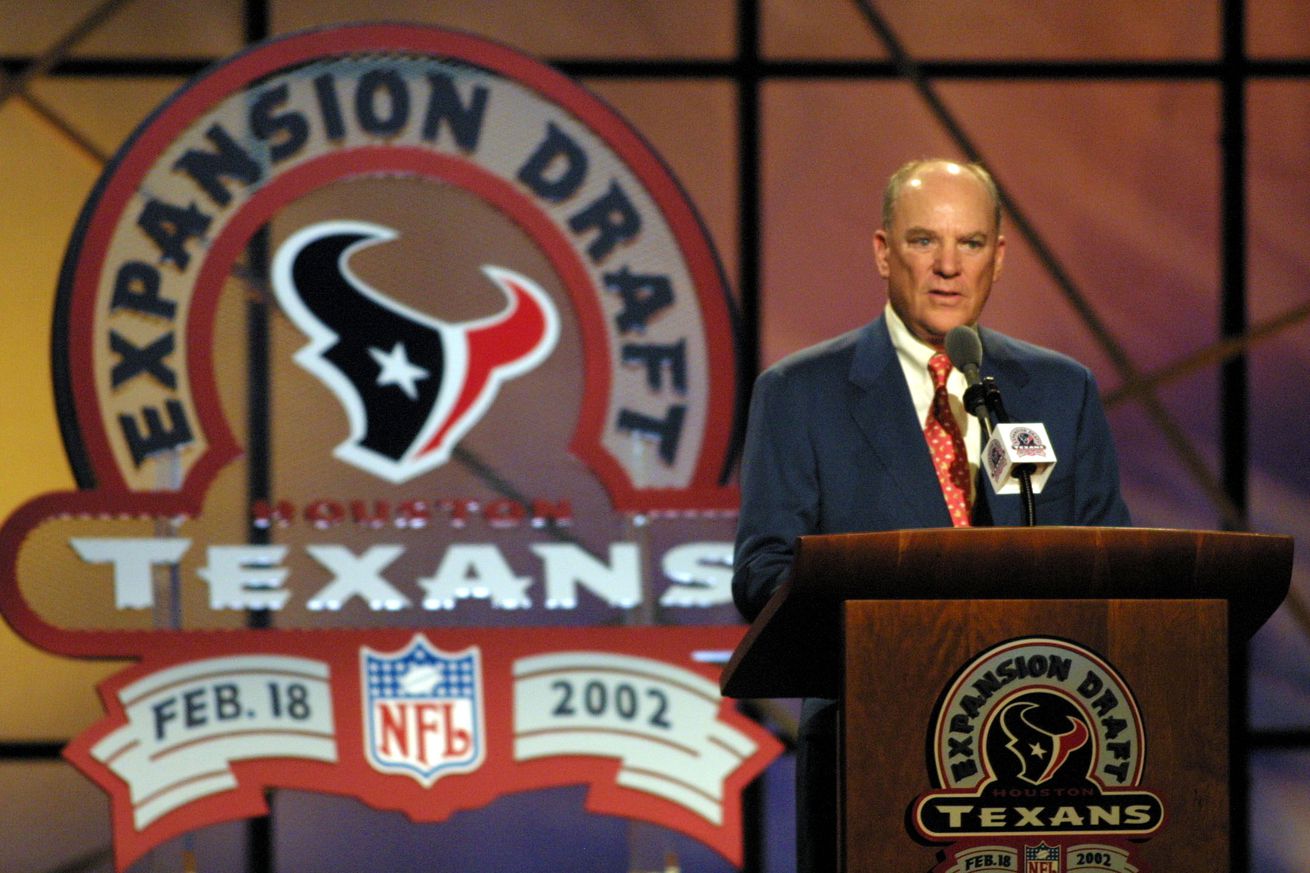
It was never a certainty that there would be a Houston Texans NFL team.
In these series of “What If’s?” for the Houston Texans, we have looked at the on and off-field moves of the Houston Texans as a NFL franchise in its 20 years of playing. Yet, what if the Houston Texans wasn’t a NFL franchise, but as an NHL franchise? What might that have looked like? How would hockey do in Houston? And what about pro football? Would it come back to Houston, and in what form?
When Bob McNair passed away, the lead on most of his obituaries was that McNair was the man who brought pro football back to Houston with the Houston Texans. Awarded the franchise in 1999, and starting operations in 2002, Bob McNair guided the Houston franchise through the first 16 years of existence. While the team has yet to deliver a Super Bowl title, the Texans’ fanbase proved one of the most loyal, generally maintaining seasons-long sellouts of all home games and long, long waiting lists for season tickets (the last couple of seasons notwithstanding). With his efforts to get a new stadium built next to the legendary, but aging Astrodome, McNair ensured that Houston would host two Super Bowls within a 13 year period. This ended a near 30-years gap between hosting the biggest sporting event in the American pop culture calendar.
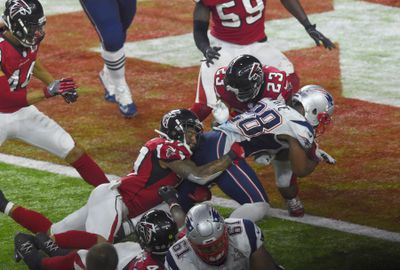
Photo by Focus on Sport/Getty Images
Yet, for all that Bob McNair managed to accomplish in bringing the NFL back to Houston, there was some regret for the wealthy owner/businessman. In an interview with the Houston Chronicle shortly before his death in 2018, Bob McNair noted a regret that he was unable to bring to Houston a National Hockey League franchise. In fact, McNair originally acted on the NHL dream before the NFL one. In 1997, as the NHL looked to add up to four new franchises, Houston was among the primary contenders. With a large media market, a city that had a history of embracing hockey in the past (see the Houston Aeros of the 1970s and 1990s of minor league hockey fame) and a rather big void in sports culture after the departure of the Oilers, McNair made his case for the NHL. Unfortunately for McNair, but quite fortunate for pro football in Houston, the NHL decided to expand to other cities, and with no hockey on the horizon, McNair turned his attention towards bringing the NFL back to Houston.
Thus, perhaps the biggest what if in the history of Texans is this: what if the NHL decided that Houston would be a great place to put another hockey team and instead of the Houston Texans being “Bulls on Parade” on the gridiron, there were the “Bulls on Ice”?
Admittedly, Houston does not naturally scream “hockey town.” Houston weather sees few days cold enough for kids to play pick-up hockey. The city did have a few minor league hockey teams, but they did not last. However, the advancement of air-conditioning capabilities gave cities like Houston the ability to maintain a ice rink. (For Houston, think of the year-round ice skating rink in the Galleria). The case of “sun belt cities” not being hockey towns fell as franchises not only emerged in places like Dallas, Anaheim, Nashville and Orlando, but they actually played good hockey (with Florida making the Stanley Cup Finals in 1995 and Dallas winning the Cup in 1999).
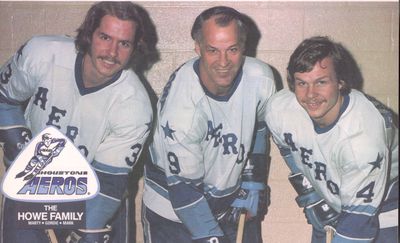
Photo by Bruce Bennett Studios via Getty Images Studios/Getty Images
For Houston, assuming that the NHL would grant them an expansion team, would the team still have the name “Texans?” The “Texans” nickname came about after the organization outsourced the nickname to popular vote. It is possible that the Texans become the nickname the city would rally around for its NHL franchise. Still, there are no shortages of names/options, between the “Western”/Agricultural nature of the city (the same “bull/steer” logo could easily apply to a hockey team vs. NFL), the space connection, or historic names (Aeros, anyone?).
Speaking of the Aeros, a major reason why the NHL did not come to Houston in the 1990s centered on where a potential NHL team might play. The primary arena at the time was the Summit, then home to the Rockets and the now-defunct AHL Aeros. Then-Rockets owner Leslie “Les” Alexander led the charge to get a new arena built to maximize profitability. However, there were significant issues in getting the Aeros to agree to the proposal for a new arena, which did not appear until 2003 with the Toyota Center. A power struggle between the owner of the Summit and Aeros (Chuck Watson) and Alexander did as much to detract the NHL as anything else. How McNair might have worked through this issue is not known, as the fate of a new arena was not settled by the time the NHL passed on Houston
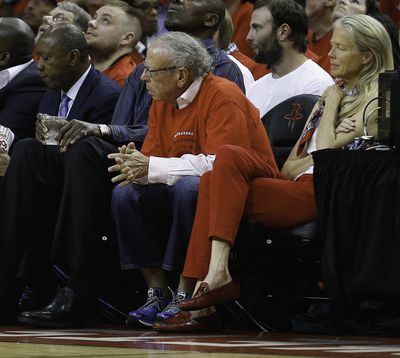
Photo by Bob Levey/Getty Images
McNair demonstrated the ability to get the city to back the football proposal since he worked out a stadium deal along with the franchise. How might McNair have managed the disputes between Alexander and Watson? A hockey-only arena was likely never going to work in Houston. The eventual sharing of an arena between the Rockets and a future NHL team was likely the only way ahead for McNair. The costs would have been cheaper than what McNair offered the NFL ($700M), but if he also had to shoulder a separate arena, perhaps not by much.
The marketing of a hockey team would be a slight challenge, given that hockey is not a natural sport in Texas. However, it is likely that Houston could manage it, especially if they somehow hit on finding the right talent for hockey. With the exception of the Las Vegas Golden Knights, who managed to make the Stanley Cup Finals in their first year of existence, expansion teams generally struggle. McNair generally made effective decisions when it came to marketing and the finances of a team. That and a burgeoning rivalry with the Dallas Stars could add some spice to the hockey market. It is possible that Houston could hit on enough moves to get a Stanley Cup to H-town, and given the dearth of titles within the city, it would be one of the most cherished awards in city history.
Given what might have had to happen with a new arena and dealing with ownership struggles and political wrangling, it is doubtful McNair could offer the resources to entice the NFL to return to Houston as quickly as he did. While Houston boasted a top 10 media market, the lackluster way that Houston said farewell to the Oilers did not go unnoticed in NFL circles, especially compared with the reaction in Cleveland. Besides, the main priority in the late-1990s for the NFL was to get a team back into the massive LA media market. The NFL gave various groups all the chances they could, but none of the attempts to bring a franchise back to LA could clear the NFL, especially since none of them could offer a new stadium deal. McNair, in addition to the team, took the advice to get the stadium funding all lined up, so that the NFL had no choice but to accept the Houston offer, even if it meant shelving LA.
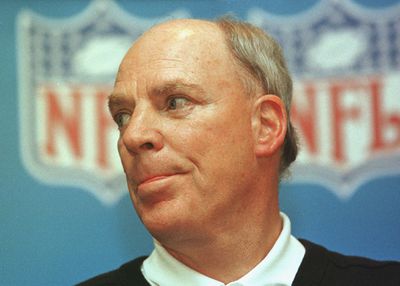
Photo credit should read MIKE FIALA/AFP via Getty Images
If Bob McNair didn’t get it done, who leads it, and when? Likely some other businessman/conglomerate would look to get football back to Houston. The sour end to the Adams’ Oilers notwithstanding, there was a strong fanbase ready for a hometown team. The NFL would get back to H-town, but it might happen years later than it did, especially if the NFL continued to prioritize Los Angeles and international outreach. If the Texans’ name is taken up by the NHL franchise, then what of a future NFL franchise? Perhaps the Roughnecks is still open, even with the inevitable trademark fight with the Titans on logo-design.
Would another franchise move to Houston? Possible. If LA got its team in the late 1990s/early 2000s, would a team like the Rams or possibly the then-San Diego Chargers, who would move back to LA in the late 2010s, decide to head for Texas instead? All dependent on timing, but if Houston still lacked an NFL team by the mid-2010s, then the right stadium deal would be enough to lure a team like the Rams from St. Louis. Admittedly, the Houston Rams doesn’t roll off the tongue. Then again, if it is with Sean McVay, Aaron Donald and an all-in deal that includes Texan product Matthew Stanford that leads to a Super Bowl LVI title, Houston Rams will likely be the city’s favorite team.
In all of these scenarios, the Texans as we know them never come to pass. Given some of the recent lack of success on the field, that might not be a bad thing to some. However, that would also deprive the city of men such as Andre Johnson and JJ Watt, who left their mark both on and off the gridiron. Yes, the team has yet to deliver so much as a conference championship game appearance, but the passion for football of all types is big in Houston. Pro football will always have a welcome home in Houston. That is not to say that hockey could never make it in Houston. With reports that the NHL is looking to expand in the next few years, maybe someone will lead the effort and the NHL will finally say yes to the Bayou City. Houston has the population and capacity to be a city with a franchise from each of the “Big Four” sports leagues. Eventually, Houston could be one of those city who has a championship from all of the “Big Four.” Now, would it be a Stanley Cup or Super Bowl first? That remains to be seen.